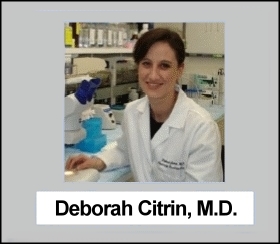
Deborah Citrin, M.D.
___________
Senior Investigator
Radiation Oncology Branch, National Cancer Institute
"I am so honored to be recognized by the Lymphoma Foundation of America for this work. I hope that patients, survivors, and their loved ones understand that although cure is our first goal, long term quality of life is increasingly important to cancer researchers. My own family has been touched by cancer and the side effects of treatment.
"I joined the faculty at NCI to study the late effects of cancer therapy on survivors. One major goal was to undertake a comprehensive mechanism-based clinical research study on the late effects on patients of hodgkin lymphoma treatments. Long-term follow-up has demonstrated greater death rates from treatment complications than from the disease itself. I am evaluating patients who have had chemotherapy alone, radiation alone, and combined modality therapy to accurately assess the risks and identify predictors of late morbidity and mortality.
"This work has profound implications for limiting the damage done by curative treatments and for developing interventions to ameliorate their effects. Because of this investigation, oncologists may be better able to predict what side effects can occur from each treatment and may be better able to tailor therapy for future patients to minimize complications. It may also help to provide evidence that injury from cancer treatments can occur many years after therapy is completed, providing strong rationale for ongoing close evaluation and careful preventative care in survivors.
|


